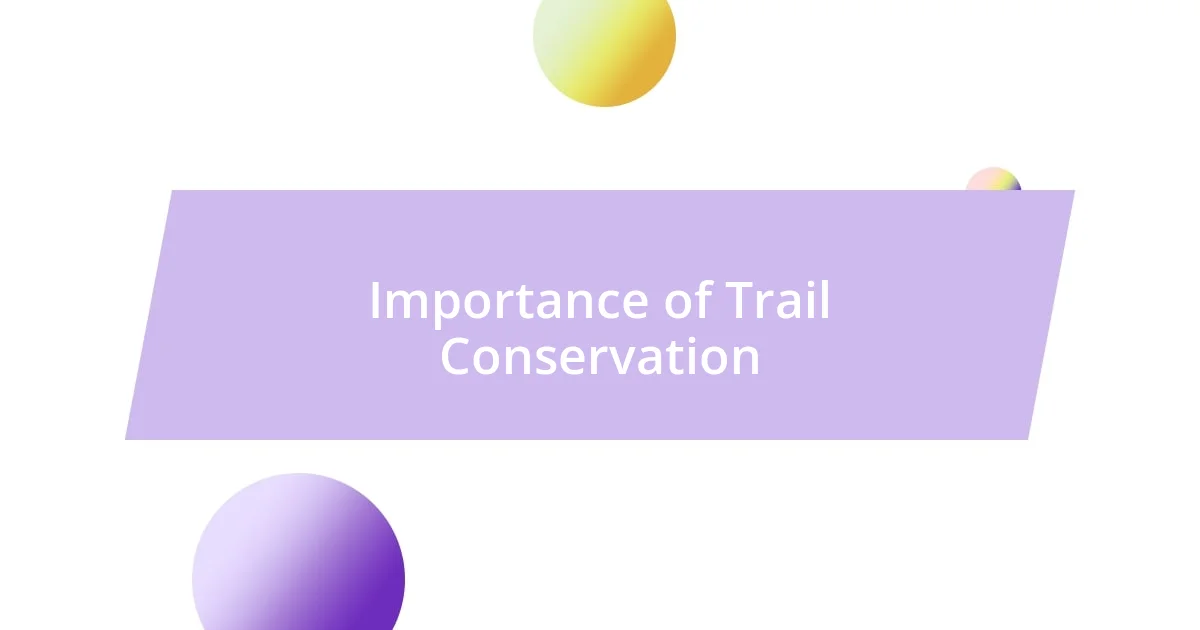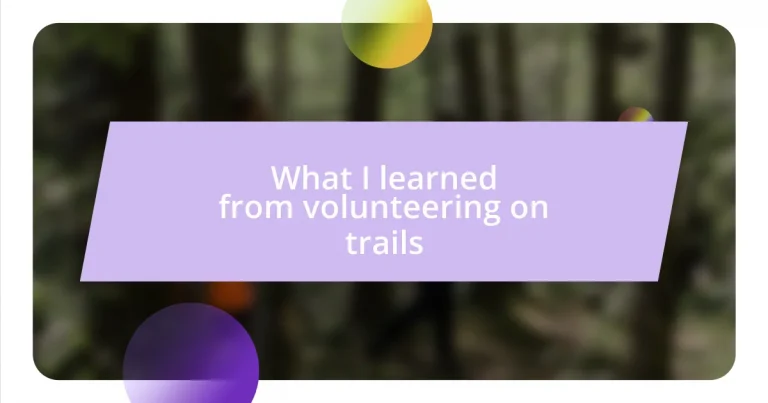Key takeaways:
- Volunteering fosters personal growth through meaningful connections, emotional well-being, and a sense of belonging, as experienced during group trail work activities.
- Trail conservation is essential for preserving ecosystems, promoting community engagement, and enhancing mental health, highlighting the collective responsibility towards nature.
- Effective volunteering requires adaptability, strong communication among team members, and setting realistic goals to ensure a rewarding and productive experience.

Overview of Volunteering Benefits
Volunteering offers a unique blend of personal growth and community service that can be incredibly rewarding. I remember my first day on the trail—surrounded by nature and motivated people. The sense of accomplishment from seeing a newly cleared pathway instilled a satisfaction I hadn’t anticipated. Hasn’t everyone felt that joyful high when contributing to something larger than themselves?
Engaging with others while volunteering fosters meaningful connections and friendships. One Saturday, as I worked alongside a diverse group, we shared stories that revealed our different backgrounds but united us in purpose. I learned that these connections often turn into lasting relationships; have you ever met someone unexpectedly while giving your time, only to find a shared passion?
Beyond the immediate benefits, volunteering enhances emotional well-being. There was a moment when I helped a family of hikers find their way and saw their relief and gratitude—it brought warmth to my heart. It struck me just how impactful a small act of kindness can be. Isn’t it fascinating how helping others can boost your own happiness and sense of belonging?

Importance of Trail Conservation
The importance of trail conservation extends beyond preserving the beauty of our natural landscapes. When I volunteered to clear paths, it became evident that well-maintained trails protect ecosystems. I recall an afternoon spent removing invasive plant species and realizing how crucial this task was for native flora and fauna to thrive. Without such efforts, the very essence of these habitats could slowly fade away, don’t you think?
Trail conservation also fosters community engagement and awareness. I remember chatting with a group of local volunteers who shared their insights into the unique challenges our local trails faced. This exchange sparked a deeper appreciation for our collective responsibility to care for these spaces. It’s amazing how a shared mission can empower individuals and drive positive environmental change, right?
Furthermore, the mental health benefits of volunteering for trail conservation are profound. Each time I took a moment to pause and truly absorb my surroundings, I felt a calming sense of connection with nature. It’s as if every swing of the tool or pick up of litter was a step towards inner peace. Those moments emphasized that conserving our trails not only benefits the environment but also nourishes our souls.
| Importance of Trail Conservation | Benefits |
|---|---|
| Protects Ecosystems | Maintains biodiversity and natural habitats |
| Community Engagement | Gathers people with a common purpose, fostering unity |
| Mental Health Improvements | Enhances emotional well-being through connection to nature |

Skills Gained from Trail Work
Trail work has equipped me with an array of invaluable skills that extend well beyond the physical tasks at hand. For instance, I learned to effectively communicate with my fellow volunteers, which was essential when we tackled challenging projects together. I recall a day when we were building a bridge, and clear communication was vital to ensure everyone’s safety and efficiency. It underscored for me how pivotal teamwork is in accomplishing shared goals, don’t you think?
Here’s a look at some specific skills I’ve gained from volunteering on the trails:
- Problem-solving: Tackling unexpected challenges, like muddy terrain or collapsed paths.
- Technical skills: Gaining hands-on experience with tools and equipment like shovels, axes, and saws.
- Leadership: Taking initiative in coordinating tasks when working with a large group.
- Environmental awareness: Understanding the delicate balance of ecosystems and the importance of preserving them.
- Physical fitness: Enhancing my strength and endurance through engaging physical activity.
- Patience and resilience: Developing the ability to persist through tough conditions and complex projects.
These skills not only enriched my trail work experience but also positively impacted other areas of my life. It’s incredible how a few weekends spent outdoors can lead to personal growth, wouldn’t you agree?

Community Engagement through Volunteering
Engaging with my community through trail volunteering has been one of the most rewarding experiences I’ve ever had. I distinctly remember a Saturday morning when a group of us gathered to clear fallen branches after a storm. The atmosphere was electric, filled not only with laughter but also a shared commitment to restoring the trails. It struck me how this simple act of coming together fostered connections that extended beyond the trees and dirt paths; we became a small family united by our love for nature.
One of the most profound realizations for me was the diversity represented among the volunteers. Some were seasoned outdoor enthusiasts, while others were new to trail work, hoping to make a difference. This mix enriched our discussions about sustainable practices and local wildlife. I vividly recall a conversation with a retired teacher who shared stories of bringing her students to the trails. It made me wonder: how many lives can we touch through our efforts in these natural spaces? I left that day feeling like we were not just improving trails, but building a community where everyone’s voice mattered.
Through volunteering, I found a sense of belonging that I hadn’t anticipated. As I participated in maintenance days, each individual’s passion shined through, whether they were meticulously planting new seeds or passionately sharing their knowledge of the local ecosystem. I often found myself reflecting on how the energy of our collective efforts could inspire others to join. Isn’t it amazing how engaging in a common goal can invigorate the spirit of togetherness? In these moments, I realized that every brush of paint on a trail post or every rock we moved was not just enhancing our environment but reinforcing the ties that bind us as a community.

Personal Growth from Outdoor Experiences
Volunteering in the great outdoors has pushed me to confront not only physical challenges but also my own limitations. I’ll never forget a moment when I faced a particularly steep slope while working on a trail, and the initial fear of slipping overwhelmed me. But after taking a breath and trusting my footing, I made it up and felt an immense sense of accomplishment. This experience reinforced my belief that stepping out of my comfort zone can lead to some of the most rewarding transformations.
Another aspect of personal growth from trail work is the deep connection to nature that emerged along the way. There was a day when we paused our work to observe a family of deer grazing nearby. Sharing that moment with fellow volunteers reminded me how vital it is to cultivate awareness of our natural surroundings. I often find myself pondering: how often do we rush through life without really stopping to appreciate the beauty around us? For me, these moments of stillness brought clarity, instilling a greater appreciation for the environment and my role in protecting it.
Finally, I’ve experienced a real shift in my mindset regarding teamwork and collaboration during my time volunteering. I recall a significant project where we had to unite multiple teams for a large restoration effort. It required us to communicate effectively, delegate tasks, and support one another. The camaraderie developed during that process was thrilling. It made me ponder: how powerful are we when we join forces for a common cause? This not only enhanced our project outcomes but also reinforced an invaluable lesson about the strength of community—both on the trails and in life.

Tips for Effective Volunteering
When you decide to volunteer on trails, being adaptable is crucial. There was a day we set out to build a new bridge, thinking it would be straightforward. As it turned out, the ground was a muddy mess that day! Instead of getting frustrated, we pivoted and came together, brainstorming alternative solutions. This flexibility not only made the day productive, but it also deepened our teamwork.
Communication is another essential tip I’ve learned. I vividly remember a time when our group leader introduced a new technique for grading trails. Initially, there was confusion about how to execute it, leading to some mixed results. However, with open conversations thereafter, we all quickly caught on, and I felt a surge of pride as our collective efforts started to reflect a well-laid trail. It taught me that asking questions and sharing knowledge is invaluable—how else can we learn if we don’t communicate?
Lastly, I believe that setting realistic expectations can significantly enhance your volunteering experience. There was a day when we aimed to complete several daunting tasks, and I found myself overwhelmed. Reflecting back, I realized how much more rewarding it felt to focus on fewer goals and do them well. Wouldn’t you agree that celebrating small victories can be just as fulfilling? I discovered that every step, no matter how small, contributes to the larger mission.














